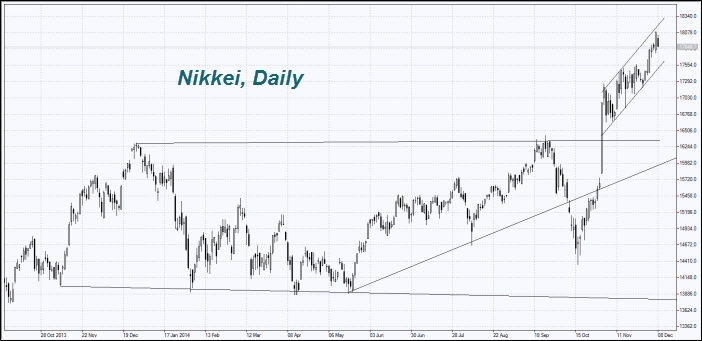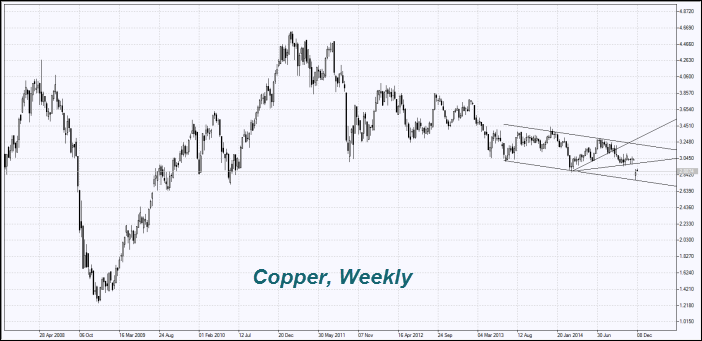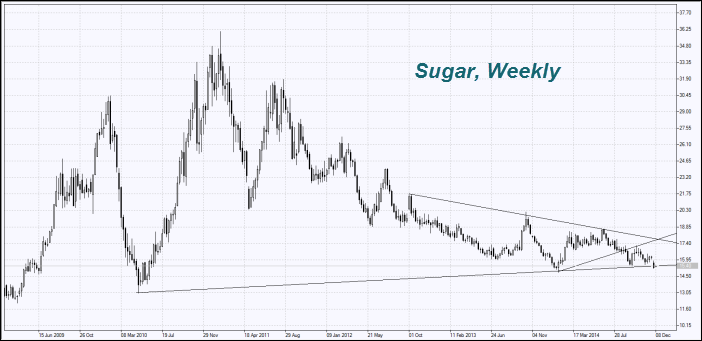By IFCMarkets
On Friday world stock indices rose after the release of positive data on the US labor market. The number of new jobs in November appeared to be at the highest level since January 2012 (321 thousand). Unemployment rate hit a six-year low of 5.8%. For 11 months in a row more than 200 thousand new jobs a month have been created in the US. Such a long period of growth is observed for the first time since 1994. Over the past year 2.33 million jobs were created and over 11 month in 2014 – 2.65 million. Such dynamics considering the low inflation rate boosts the economic growth and bolsters the US dollar index. Today it has hit a six-year high. Dow and S&P 500 closed higher for the seventh consecutive week. However, weak data on factory orders in October was released on Friday. They fell for the third consecutive month. Currently, US stock indices futures are traded down. There is no more significant macroeconomic data released for today in the US.
European stocks are slipping down after Friday’s advance. It was caused by a slowdown in German industrial production in October, 0.2% vs. the projected figure of 0.4%, and a significant reduction in imports to China in November (6.7%). This indicator was expected to add 3.8%. One more negative factor for fallen European markets was the downgrading of Italy’s credit rating from BBB to BBB- by Standard & Poor’s agency.

Nikkei has also dipped down after a strong gain. Its dynamics coincides with the global trend. It should be noted that significant yen depreciation was an extra factor in favor of the exporters’ stock rise. Toyota Motor stocks upped 1.5%. Negative economic data which affected the exchange rate was published yesterday in Japan. The reduction in Q3 GDP outperformed forecasts. The trade deficit in October was higher than expected. The next release of Japanese economic statistics will be published on Wednesday morning. In our opinion, the main event of the week may become the elections in the Japanese parliament held on Sunday. New MPs are supposed to support the monetary policy conducted by the Prime Minister Shinzo Abe, aimed at further yen weakening.
World oil prices halted its decline. Despite the overall reduction of Chinese imports, crude oil purchases increased 7.9% in November, compared to the same period last year, and upped 9% compared to October. Currently, China purchases 6.18 million barrels a day. International Energy Agency raised its growth forecast of Chinese oil demand in 2014 up to 2.5% vs. 2.3% as was expected in September outlook. Note that the OPEC production in November reached 30.56 million barrels a day, compared to agreed 30 million. The oil output has been outperformed for six months in a row. According to the US Commodity Futures Trading Commission, WTI crude oil net long positions increased 12% over the past week. Net short positions slumped 15%, while net long positions upped 4%. Probably, hedge funds take profits and do not expect a strong decline in oil prices from current levels.

According to the Commodity Futures Trading Commission, hedge funds increased gold and silver net long positions over the past week. Copper net short positions have also risen. Note that copper is not getting cheaper as China raised its imports 5% in November.
Free Reports:
 Get Our Free Metatrader 4 Indicators - Put Our Free MetaTrader 4 Custom Indicators on your charts when you join our Weekly Newsletter
Get Our Free Metatrader 4 Indicators - Put Our Free MetaTrader 4 Custom Indicators on your charts when you join our Weekly Newsletter
 Get our Weekly Commitment of Traders Reports - See where the biggest traders (Hedge Funds and Commercial Hedgers) are positioned in the futures markets on a weekly basis.
Get our Weekly Commitment of Traders Reports - See where the biggest traders (Hedge Funds and Commercial Hedgers) are positioned in the futures markets on a weekly basis.

Sugar prices rose slightly due to the Brazilian company Unica’s outlook, which expects to reduce the crop of 2015/2016 to 29-30.3 million tons vs. 31.4 million tons a season earlier. The ethanol production from sugarcane would increase 2%.
Market Analysis provided by IFCMarkets